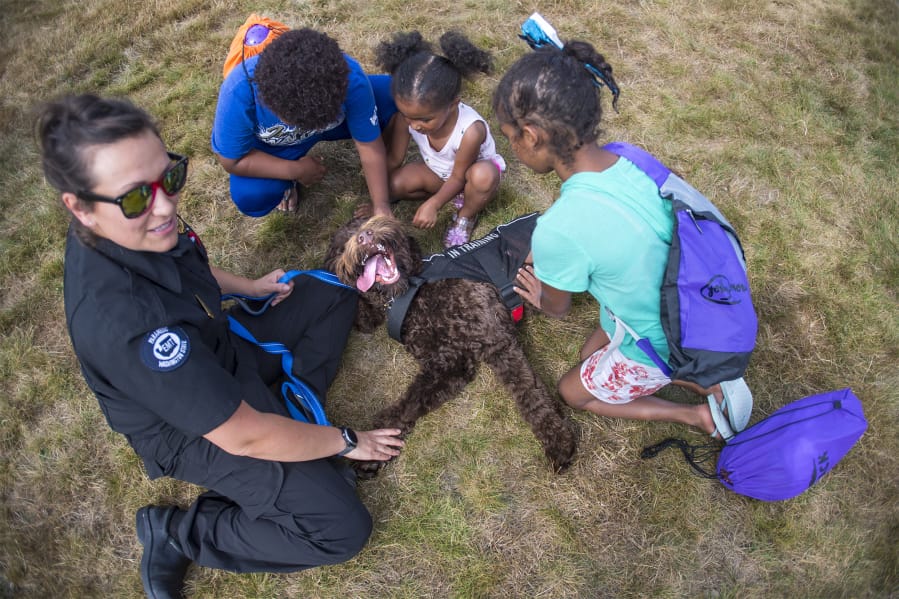Local first responders will soon have a four-legged method of coping with high-stress calls.
American Medical Response of Southwest Washington has been training Apollo, a 7-month-old brown labradoodle, as a therapy dog. The ambulance service provider hopes Apollo can earn a therapy dog certification and begin responding to calls next year.
AMR’s National Therapy Dog Team formed in the wake of the 2016 Pulse nightclub shooting as first responders continue searching for ways to cope with emotional stress. Dogs have responded to several mass incidents since then, most recently the shooting in El Paso, Texas.
Apollo is the 13th member of the program, which now involves 21 canines. He is also the first to be stationed on the West Coast.
Therapy dog visits can reduce blood pressure, heart rate and anxiety while increasing endorphin and oxytocin levels, according to the National Center for Biotechnical Information.
“Our crews are getting busier with more calls,” said Kanessa Thompson, AMR community relations coordinator and Apollo’s handler. “We thought he could be a good addition.”
Apollo — a name chosen by the AMR staff to replace his original designation, Alfred Hitchcock — was bred at Trail’s End Labradoodles in Sandy, Ore. Dogs bred there “come from champion bloodlines and are selectively bred for brains, beauty and great temperament,” according to the breeder’s website. Labradoodles are a cross between a Labrador retriever and a standard poodle.
When Apollo was eight weeks old, Kanessa and Scott Thompson, Clark County AMR supervisor, took him into their home and became his permanent handlers. Initially, Apollo behaved like a normal puppy — chewing furniture, urinating on things and showing other typical canine behaviors.
His handlers were soon surprised by the puppy’s intelligence. Apollo learned how to shake hands, for example, in one day.
“People can’t believe how well he’s doing at seven months old,” Kanessa Thompson said.
When it’s time to work, Apollo wears a vest that serves both as a uniform and a signal for him to focus on tasks ahead. After work, when the vest comes off, his demeanor shifts.
“It’s great when he gets home to see him be a dog,” Kanessa Thompson said. “You take his vest off and he gets to be a puppy and play.”
At 12 weeks old, Apollo spent 12 days training at Enzo’s Acres dog training in Battle Ground. The Thompsons hope he will earn an obedience certificate by the end of the year and the therapy dog certification before he turns 1 1/2 years old.
In the meantime, Apollo spends most of his time in AMR’s Hazel Dell operations center as well as at schools, fire and police stations, nursing homes and community events.
“He’s been doing phenomenal with all of the things we’ve exposed him to,” Kanessa Thompson said. “He’s brought a lot of smiles to people and just changes the entire atmosphere of the operations.”
Among other events, Apollo spent time at a Clark County Fire District 6 open house. His people skills stood out, district spokesman Dave Schmitke said.
Those skills will be helpful for those responding to high-stress calls, especially ones involving children, Schmitke said. A 2017 study by the Ruderman Family Foundation, a Boston philanthropic organization, found that first responders are more likely to die by suicide than in the line of duty and that stigma can often be a barrier to seeking help.
“We would probably be more willing to let our guard down to a dog than other people,” Schmitke said. “They don’t ask sensitive questions. They’re just there.”
Once fully certified, Apollo will be on-call all day, every day and live full time at the AMR operations center. He will respond to calls with the company’s critical incident stress management team, typically activated three to four times per month, Kanessa Thompson said.
“I don’t wish tragedy on people,” she said, “but I’m excited to see him go to work.”




